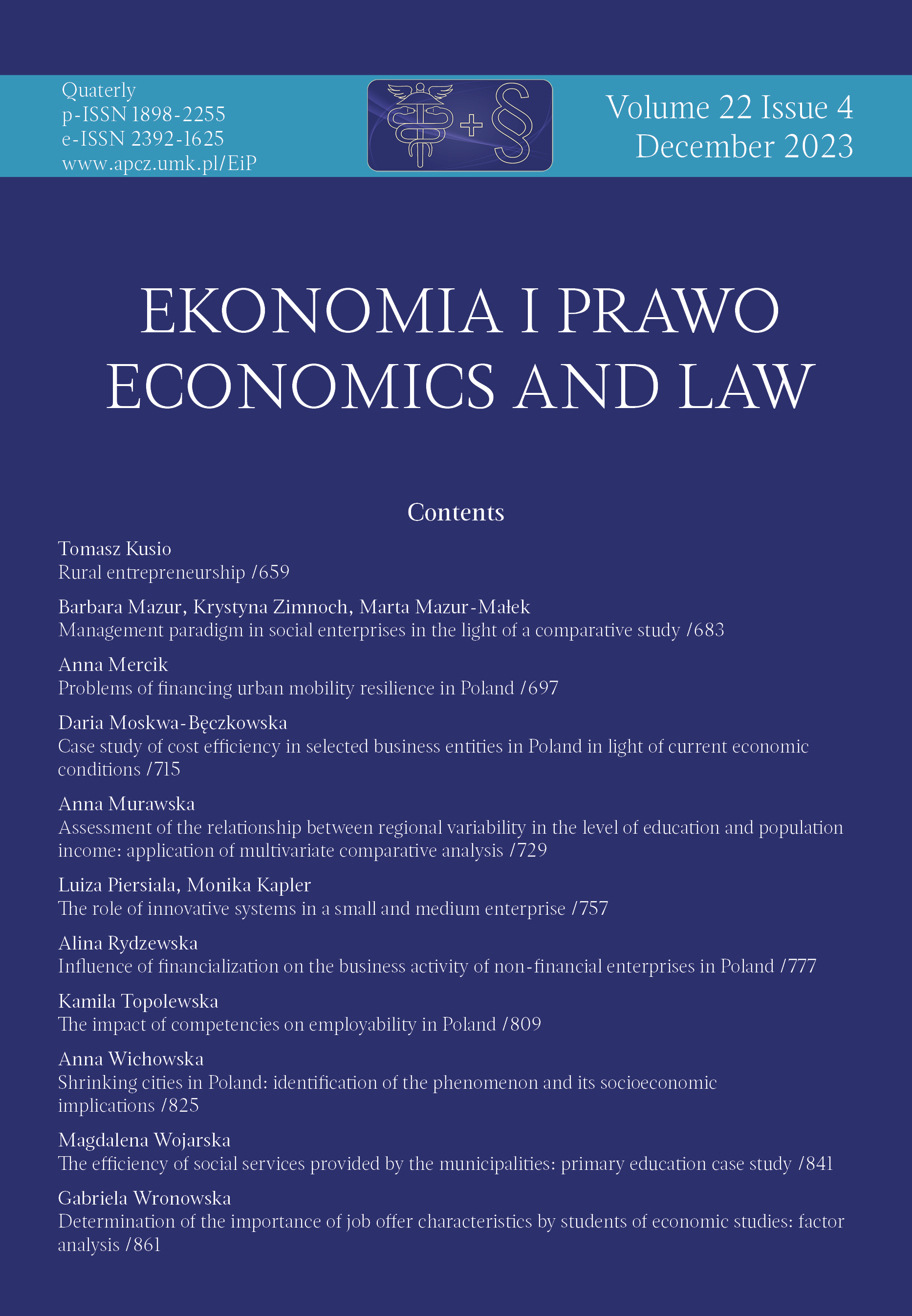Management paradigm in social enterprises in the light of a comparative study
DOI:
https://doi.org/10.12775/EiP.2023.036Keywords
social enterprises, commercial enterprises, management paradigm, Polish enterprises, humanistic managementAbstract
Motivation: Social enterprises are gaining importance in the modern economy. This entails the need for a better understanding of their mechanisms. For this reason, it is necessary to study the basic assumptions on which their effective management is based.
Aim: The aim of the article is to identify the management paradigm in social enterprises, compared to commercial companies, on the basis of financial reports created by their management boards. In order to identify the management paradigm adopted in a given group of enterprises, reference was made to the concept of responsibility. The conceptualization of responsibility is based on the Triple Bottom Line (TBL) model, which includes three dimensions: social, environmental, and economic.
Results: The research method is a comparative analysis of the content of financial reports of 30 selected social enterprises and commercial companies representing the dairy, trade, and insurance industries in Poland. The survey is qualitative in nature. Results confirmed that there are essential differences in the management paradigms of the two types of enterprises. The reports contain statements confirming responsibility in every dimension but compared to commercial enterprises, the social and environmental aspect in management reports of social enterprises is more often presented, has more manifestations, a broader and a deeper scope. The scope of the content of these reports allows for the conclusion that they have greater awareness of responsibility for society and the natural environment than commercial enterprises. On the other hand, the analysis of the content of management board reports of commercial enterprises shows that their dominant sense is economic responsibility. The picture that emerges from the analysis of social enterprise reports shows the regular use of elements of the humanistic paradigm, while the economic paradigm is more frequently applied in commercial companies.
References
Apanowicz, J. (2000). Metodologiczne elementy procesu poznania naukowego w teorii organizacji i zarządzania. Wyższa Szkoła Administracji i Biznesu.
Arandia, O., & García-de-la-Torre, C. (2021). Humanistic management: a history of a management paradigm from the human dignity. In C. García-de-la-Torre, O. Arandia, & M. Vázquez-Maguirre (Eds.), Humanistic management in Latin America (pp. 1–20). Routledge. https://doi.org/10.4324/9780429351174.
Camargo Benavides, A.F., & Ehrenhard, M. (2021). Rediscovering the cooperative enterprise: a systematic review of current topics and avenues for future research. Voluntas, 32, 964–978. https://doi.org/10.1007/s11266-021-00328-8.
Czerwiec, E. (2011). Towarzystwo ubezpieczeń wzajemnych jako przedsiębiorstwo społeczne. Zeszyty Naukowe Uniwersytetu Ekonomicznego w Krakowie, 848, 55–62.
Defourny, J., & Nyssens, M. (2012). Conceptions of social enterprise in Europe: a comparative perspective with the United States. In: B. Gidron, & Y. Hasenfeld (Eds.), Social enterprises (pp. 71–90). Palgrave Macmillan. https://doi.org/10.1057/9781137035301_4.
Dierksmeier, C. (2011), Reorienting management education: from the homo economicus to human dignity. Humanistic Management Network Research Paper, 13/05, 1–31. http://dx.doi.org/10.2139/ssrn.1766183.
Doherty, B., & Kittipanya-Ngam, P. (2021) The role of social enterprise hybrid business models in inclusive value chain development. Sustainability, 13(2), 499. https://doi.org/10.3390/su13020499.
Ghoshal, S. (2005). Bad management theories are destroying good management practices. Academy of Management Learning & Education, 4(1), 75–91.
Gintis, H., van Schaik, C., & Boehm, Ch. (2019). Zoon politikon: the evolutionary origins of human socio-political systems. Behavioural Processes, 161, 17–30. https://doi.org/10.1016/j.beproc.2018.01.007.
ICA. (2022). Cooperative identity, values & principles. Retrieved 30.09.2022 from https://www.ica.coop/en/cooperatives/cooperative-identity.
Kożuch, A., & Książek, E. (2014). Spółdzielnia socjalna jako forma przedsiębiorstwa społecznego. Prace Naukowe Akademii im. Jana Długosza w Częstochowie: Pragmata tes Oikonomias, 8, 181–189.
KRS. (2010). Raport o spółdzielczości polskiej. Krajowa Rada Spółdzielcza.
Melé, D. (2003). The challenge of humanistic management. Journal of Business Ethics, 44, 77–88. https://doi.org/10.1023/A:1023298710412.
Melé, D. (2013). Antecedents of current situation of humanistic management. African Journal of Business Ethics, 7(2), 52–61. https://doi.org/10.15249/7-2-39.
Miller, T.L., Wesley, I., & Curtis, L. (2010). Assessing mission and resources for social change: an organizational identity perspective on social venture capitalists’ decision criteria. Entrepreneurship Theory and Practice, 34(4), 705–733. http://dx.doi.org/10.1111/j.1540-6520.2010.00388.x.
Mott Machado, M., & Mendes Teixeira, M.L. (2017). Dignity in the context of organizations: a look beyond modernity. Mackenzie Management Review, 18(2), 80–103. http://dx.doi.org/10.1590/1678-69712016/administracao.v18n2p80-103.
Nair, P. (2022). Embracing hybridity: a business model innovation for sustainable social enterprises. International Journal of Business and Society, 23(3), 1600–1617. https://doi.org/10.33736/ijbs.5186.2022.
Pachura, A. (2021). Modelling of cross-organisational cooperation for social entrepreneurship. Social Sciences, 10(6), 201. https://doi.org/10.3390/socsci10060201.
Pelizza Vier Machado, H., Gaiotto, S.A.V., & Rovaris Machado, M.C. (2021). Growth and social entrepreneurs: the challenge of conciliating economic and social values. Revista de Gestão, 28(1), 1–21. https://doi.org/10.1108/REGE-02-2019-0033.
Pirson, M. (2017). Humanistic management: protecting dignity and promoting well-being. Cambridge University Press. https://doi.org/10.1017/9781316675946.
Pirson, M., & von Kimakowitz, E. (2010). Towards a human centered theory and practice of the firm. Fordham University Schools of Business Working Paper, 006, 1–40. https://dx.doi.org/10.2139/ssrn.1654827.
Wujec, H. (2006). Ekonomia u podstaw. Tygodnik Powszechny, 26.09.2006.
Downloads
Published
How to Cite
Issue
Section
License
Copyright (c) 2023 Barbara Mazur, Krystyna Zimnoch, Marta Mazur-Małek

This work is licensed under a Creative Commons Attribution-NoDerivatives 4.0 International License.
Stats
Number of views and downloads: 719
Number of citations: 0
